Adult Book Reviews
Fiction
Nonfiction
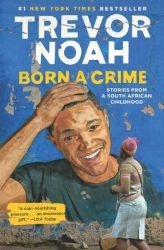
This book is very, very good. While I tend to steer away from biographies and non fiction literature, this book was very interesting and fun to read. Exploring Trevor Noah’s childhood-young adulthood, this book educates its readers on the racial and violent issues that occurred during the apartheid era within South Africa. This book is extremely well written and often times witty. It had me laughing, then crying, then laughing again. I really recommend it!
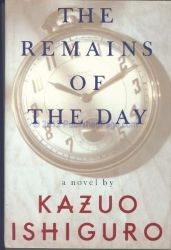
I loved this book! The writing is excellent and it has a very unique storyline. The main character of the novel is Williams, a butler that takes care of a wealthy manor. However, Williams struggles to separate his work and life. While he is very proud of himself and the work he accomplishes, he struggles to obtain things that other humans find joy through such as: hobbies, a lover, a family, etc. I’ve never read a book like this before, and I can see why it’s so well-known and critically acclaimed!
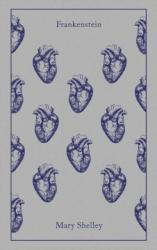
I really enjoyed reading this book! Mary Shelley's 'Frankenstein' is a classic novel that everyone knows. It's a tale about Victor Frankenstein, a scientist, and how he creates life. Except it's made from body parts. What I liked about reading this is that this is the original. Young readers don't really know about all the other complex parts of the story. It was so interesting to read and learn about a narrative I never knew before. More on the plot, it's about how Victor creates a creature and then the seemingly endless and terrifying consequences.
However, this book is incredibly hard to read. The old way it's written makes it easier to get lost or not completely understand what happened. There's a lot of words I had to look up, but the context also helps decipher it. One of my favorite parts of the book is the building suspense. Ultimately, I think this book has so much beauty, because of all the emotions I had while reading it and the message it carries about human nature.
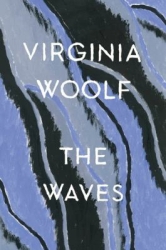
Written in the “stream of consciousness” style, this book is very interesting, but honestly hard to read. There are 6 characters who we follow. Starting when they’re pre-schooler age, to their deaths. Each character has definitive characteristics. I believe each character is supposed to be relatable to in some way, as many of them battle with insecurities, self-comparisons, passions, depression, etc. The writing itself is very good, but it just wasn’t my favorite.
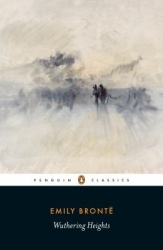
Wuthering Heights by Emily Brontë is a masterpiece! I definitely see why it is such a well known novel. However, it is a Victorian gothic novel, so it does explore uncomfortable themes such as incest and abuse. However, it doesn’t delve into them in a way that’s triggering or uncomfortable. This novel focuses on the Earnshaws, a wealthy family that owns the manor Wuthering Heights. While the family of four once lived happily, one night their father returns home with a new child named Heathcliff. A darker-skinned child from unknown origins. As the child adapts to his new environment, facing abuse and belittlement, he begins to slowly take over the manor. This story is super interesting if you’re interested in dramatic stories! I’d definitely recommend, just be wary of any uncomfortable themes. :)
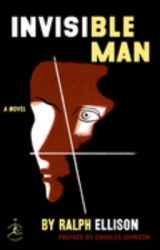
I recently had to read this novel for a class, and I have to say it is very good! While it explores complicated themes such as visibility, African-American movements/social standing, and life in early 1900’s America, it communicates the hardships and intricacies extremely well. The narrator, a black man in the early 1930’s-1940’s, loses his memory of his early life, including his family and even name. He travels through America; experiencing, learning, and exploring what his new life has to offer. Every experience is different, yet still very interesting, which made it feel like I was almost reading separate stories! Yet, it didn’t feel choppy or fragmented in the least. So, I’d highly recommend! I’ve never read any other book like this, and it definitely taught me a lot.
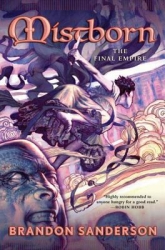
Rebellion in this world is impossible, the king is immortal, and the people are weak, but Kelsier is determined to make a change. Kelsier has a wild plan, Vin a street urchin, gets wound up in this plan. She realizes that this goes deeper than she thought, and that there is always another secret.
This is one of the first books by Brandon Sanderson I've read and it's magnificent. This fantasy book is one of the best I've read, with twists and turns in every chapter. The characters feel real because of their bonds with each other. This is definitely a book that explores relationships, magic, and rebellion.

Once already addicted to the previous two books of this series, the final book of the trio was a must have! Darth Bane: Dynasty of Evil keeps the readers on the edge of their seats! Bane has finally finished training his apprentice, Darth Zannah, in the ways of the Dark Side; However, she seems unwilling to take the title of master for her own. Bane must decide whether to wait longer for Zannah to overthrow him, or he much quickly choose a new apprentice. Which will he choose? Darth Bane, Dynasty of Evil is a perfect book for Star Wars fans, and is an epic ending to the Darth Bane Trilogy.
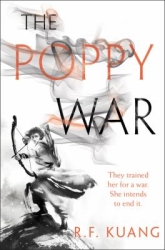
What initially drew me into The Poppy War was all the great things I had heard about the book and it's author R.F. Kuang. Fang Runin, the female main character, was both enjoyable and relatable at many times as she fought for a spot in Sinegard, the country's most elite military academy, in hopes of getting away from an arranged marriage. The book spans over a few years and eventually deals with some very intense and dark themes throughout the book. Kuang does not shy away from any details and makes the book feel incredibly real and allows a deeper connection with the character's emotions.
The pace of the book really picks up towards the second half, and I was constantly surprised where the story went next. The Poppy War is also very heavily inspired by Chinese folklore, but Kuang adds her own touch to the story, making the book seem very unique. I really enjoyed this book and is a definite five star for me.
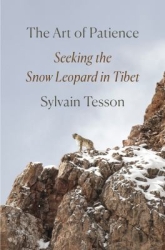
An engaging adventure story that celebrates reverence for nature, curiosity about the world, bold explorations into the wild, and a poetic narration that is both reflective and inspiring.
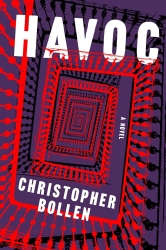
As a reader, do you gravitate towards relate-able, conventional, sweet narrators and stories that follow a comforting and predictable arc, ending in the literary version of “All is well”? If so, then read no further. Christopher Bollen’s page-turning, stomach-churning, prediction-spurning Havoc is not the novel for you.
Bollen’s sole narrator is octogenarian Maggie Burkhardt, a Wisconsin expatriate in Egypt during the pandemic, and Bollen’s use of the first person pays satisfying homage to its origin as an “unreliable narrator.” The book’s synopsis gives us a strong nudge in the “be wary of this narrator” direction, but it also complicates matters by adding an 8-year-old boy, arriving at the shabby-chic hotel on the edge of the Nile in the Sahara Desert with his harried mother, who quickly morphs into an unsettling and eerie nemesis for Maggie.
The peripatetic, well-heeled guests, Ben and Zachary, an American gay couple whom Maggie has befriended and feels comfortable with, as well as Ahmed, the local hotel manager with the proverbial heart of gold, who has warmly welcomed Maggie since her arrival from a mysteriously swift departure from Switzerland, provide rich and believable layers of characterization and sub-plots that robustly deliver from start to finish. But there’s never a doubt that Maggie is the axis around which this beguilingly straightforward yet actually quite twisty plot revolves.
While busying herself with ruminations about which guests might need her special “help” in overturning their lives for the good (ahem)—something Bollen makes sure that readers know is not a newly developed habit--Maggie tries and, to her astonishment, spectacularly fails to befriend young Otto. Subsequently, she becomes convinced that the precocious and troubled 8-year-old, who has quickly inserted himself into the homey interpersonal fabric of the sprawling and laid-back hotel, is on to her. As it happens, she may be right.
Bollen skillfully lays a crumb trail for readers—though never too many crumbs at once!—to suss out and/or add puzzlement to Maggie’s history and motives. Was Maggie’s long-time marriage to Peter who predeceased her as perfect as she recounts? And what’s going on with their daughter who appears in brief, hazy recollections as both a child and an adult when “she died”? The uneasy pleasure of this novel rests in the interwoven nature of Maggie’s unreliable memory and self-talk with the disturbing and escalating aspect of her and Otto’s game of one-up-man-ship. Is Maggie right about her suspicions of this child? Is the kid, in this case, “all right” or….decidedly not? And when friendly Ahmed finally cools towards Maggie because he’s heard just one too many contradictions in her back-story, should we feel pity for someone whose sanity is unraveling or a fervent hope that she be caught out before something worse happens?
The answers to these questions may possibly differ for every reader. But the staggering conclusion, rendered with an admirable combination of nail-shredding suspense and gut-punching abruptness, seemed worthy of Poe to this reader. Kudos to Bollen on his rendition of a “tale of mystery and imagination!”
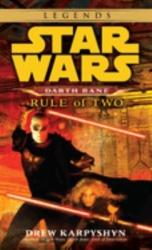
After getting a taste of the raw thrills provided by Drew Karpyshyn’s first novel, Darth Bane: Rule of Two was a must-have! Now having destroyed the Brotherhood of Darkness, Bane must find a suitable apprentice to carry on the power of the Dark Side; His choice: a little girl called Rain who, despite her size, is immensely powerful in the dark side. Bane must struggle to trust his choice of an apprentice, for the future of the Sith relies on it, while Rain must prove that she is worthy of the title of a master. With a similar mix of action as the previous book, this novel also incorporates an integral struggle, making it even more interesting. Darth Bane: Rule of Two will certainly have your hyperdrive engines ready to boost to the third and final book of the series!
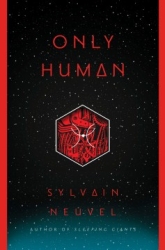
While I was not actively looking forward to finishing this trilogy, I’m glad I finished it for the sense of closure it brought. I still think Sleeping Giants had such an intriguing concept in how it relayed information to the reader, but that you could only really make that work for a single book. With a cliffhanger in each book of the series, I was hoping Only Human would wrap up everything and provide a satisfying conclusion. It certainly did its best to answer all the questions that came up during the previous books, but the ending didn’t particularly wow me.
The difficulty of maintaining a narrative through reports and journal entries is only exacerbated here because the human characters are the only ones who can convey what it is like to live on an alien planet. The jumping back and forth between the past and present was an OK way to hide some of the bigger reveals, but the biggest problem is the snarky nature of most of the characters. I know it’s likely written for laughs, but after a while it becomes tiresome as the events unfold.
In terms of its message, Only Human didn’t feel like it had anything new to say. Introducing the aliens after everything that they put humanity through in Waking Gods felt somewhat anticlimactic as the major action of this book centered on the same old arms race between countries on Earth. Sure, the moral of the story was perhaps clearer here than in the previous books, but probably more as a foot stomp to make sure the readers got the point of the entire series. If I were to recommend the Themis Files again, I’d suggest readers stick to just the first book.
An ending that tied up loose ends but didn’t particularly wow, I give Only Human 3.0 stars out of 5.
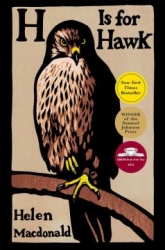
A book you can't put down, but have to in order to digest each chapter fully. Macdonald ties in the experience of grief with her study and work with the most violent falcons. Reflective, penetrating, psychic, and wise - Macdonald connects seemingly unrelated topics to the basics of the human condition - effortlessly, as if her words are music and poetry flowing in and out of various moments in time. A book you will want to re-read once you finish it. Truly an original piece of work!
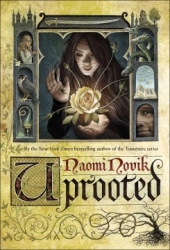
One of my first experiences with the writing of Naomi Novik was with Spinning Silver . This Rumpelstiltskin retelling was quite interesting and complex compared to the original fairy tale it was based on. Realizing this was the second in a “series” (of which I’m using this term loosely), I eventually sought this book’s predecessor. Uprooted seems to be an adaptation of eastern European folktales, but with more of the romance aspect that I expect from these kinds of fantasy books.
As with other fairy tale retellings, Uprooted starts off with plenty of tropes from the Grimm fairy tales. Dragons stealing maidens from their families, peasant farmers in poverty, things like that. It continues into the predictable tropes of the Dragon being misunderstood and the fair maiden resisting his cold personality long enough to have him warm up to her. Fortunately, this book is deeper than the tropes it was based on. The depth of the story is partly why it's much longer than the common folktales it might be based on.
I appreciated the magic system and the descriptions of how it felt to use this magic. I thought the cursed woods trope was developed in a much more interesting way than you usually see in these kinds of stories. The eventual romance between the two characters was telegraphed for a while, leading to a slow burn that was fairly erotic. About my only qualm with this book was the audiobook narration. The narrator had an authentic sounding eastern European accent, which fit the story's potential origins, but at the cost of being unable to understand what she was saying sometimes.
A deeply rich fairy tale with both old and new tropes, I give Uprooted 4.0 stars out of 5.
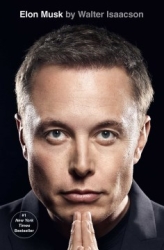
Elon Musk by Walter Isaacson is a tremendous book from start to finish. It captures the complete story of the billionaire and does not hesitate upon showing the many struggles he overcame to reach the level he is at today. It is completely unbiased and shows the many positives and negatives of Musk's personality. The amount of detail cannot be found within any other Musk paragraph. I highly recommend this book to readers with aspirations of starting their own business.
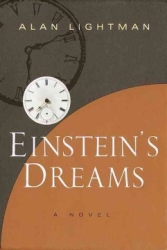
I can appreciate poetic works that try to string each idea together into a connected narrative. I've seen few that have done this as well as Einstein's Dreams has. Of course, the problem with trying to make all these disparate poems work together is that they are still just brief glimpses into stories that could easily stand on their own. Perhaps that's the curse of well-written poetry—it leaves you wanting more. I'd almost consider these stories as writing prompts for anyone looking to make an entire book out of the dreams of the world's best physicist.
Many of the stories in this collection/novel play upon the ideas of general relativity. The way the physics is described and how the people in these worlds live feel legitimately realistic. Of course, sometimes the physics "gimmick" isn't revealed until the end of a story, thus leaving me in the dark as to what was actually happening as I read through the dream. I didn't have enough patience to read through these stories again to fully understand the way their worlds worked.
As a cohesive narrative, there isn't much that advances the story here. It's mostly focused on exploring interesting applications of theoretical physics in the terms of people and their lives. Some are stronger than others, but they're all basically the same idea repeated a couple dozen times in slightly different packaging. And maybe I was expecting something more like Shakespeare in Love (1998) where Einstein's dreams help him break through the concepts he's trying to discover. Instead, the titular character is only in a few pieces of joining text that frame the whole collection. But at least the prose was pretty.
Poetic exploration of theoretical physics, I give Einstein's Dreams 3.0 stars out of 5.
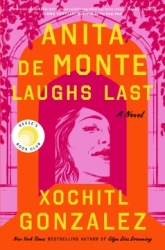
Gonzales is both a non-fiction and fiction writer, whose excellent articles I've read in well-known publications like The Atlantic Monthly. This book is the first novel of hers I've read, and I was not disappointed.
Our two key narrators are Anita, a Latina artist whose husband, we discover right away, killed her in 1980s New York City; and Raquel, a Latina art student in late 1990s Rhode Island, trying to find her way in a predominantly white and privileged community while also maintaining and respecting her cultural roots.
Both Anita (who narrates from the world of the dead and who can use a form of Santeria to manifest her actions and "essence" to people still living) and Raquel share the experience of falling for privileged and self-involved white men, both of whom are controlling and abusive in various ways. While Anita is a fighter to the last, Raquel's self-confidence rises slowly but steadily throughout the novel until the finale when readers see her blossom into a woman who can and will stand up for herself and for her family and true friends.
Beyond the two women's dangerous (and in Anita's case. deadly) relationships with controlling white men, the other linked plotline centers on Anita's art work being gradually erased after her death and the promise that Raquel will somehow unearth those works and breathe new life into them. My only quibble with the progress of this plotline is that its resolution felt rather rushed, not quite providing the satisfaction that a slower, longer narrative of Anita's re-discovery would have.
Gonzales's writing style is propulsive in parts and poetic in others. Her two protagonists are drawn vividly, and even without the named alternating chapters, it would be hard to confuse one voice with another. The conclusion of both narrators' stories shines a light on the importance of women defining themselves outside their roles in men's lives. I think Gonzales also does well to portray Anita and Raquel not simply as victims of male violence and general douche-baggery but as flawed, smart, emotionally conflicted women whose sexual and romantic decisions are as fraught with passion and blind spots as any real-life woman's is.
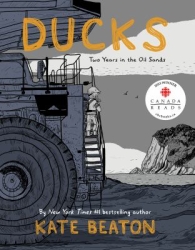
Having only really experienced Kate Beaton's web comic, Hark! A Vagrant and her sillier material, I was interested to see how a graphic novel of her life would play out on the printed page. I was shocked to find her somewhat whimsical style had so much emotion for a story that was assuredly a difficult one to tell. Ducks: Two Years in the Oil Sands is as gripping as it is frustrating that such working conditions remain this dangerous for women.
Telling the story of how Beaton paid off her student loans from art school in the fastest way possible, Ducks highlights the misogyny and sexism present in the (frankly) male-dominated field of petroleum. Working on the oil sands isn't safe in a physical sense, but add to that the "hanging with the guys" tropes that eventually lead to assault. It was hard to read sections of this book, knowing that men should be better than this. Beaton pours her trauma out on the page and it stuck with me in a way that only a graphic novel like this could convey.
I'd say that this book should be required reading for both men and women going into these fields, but I know it probably wouldn't change anything. There's too much inertia to effect the significant changes that would need to happen. This shouldn't lessen discussions about the depression, substance abuse, and suicide that men in these jobs endure, but instead highlight the tenuous strengths and inevitable weakness of humans pushed to their breaking points. For some, though, it is a lifestyle. For the lucky ones, they make it out alive in as little time as possible—which is still long enough to have lasting negative effects on their lives.
A deeply moving memoir about women working in a male-dominated field, I give Ducks 5.0 stars out of 5.
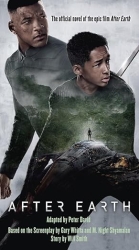
It's weird how a bit of hindsight brings a work into full focus. I never watched the movie After Earth (2013) because of its critical reception among audiences and critics alike. I figured maybe I would give the novel a try, not realizing it was not some work that the movie adapted, but instead a novelization of the movie itself. This was clearly a Will Smith passion project and never have I seen such blatant self-inserts in a work of fiction.
While the author of this novelization may be Peter David, Will Smith was behind much of this plot. Seeing the home life of the adult character in this book mirroring the home life that we know between Will and Jada is cringe-worthy. What's worse is that these characters (either the Will or the Jaden stand-ins) were so flat and boring as to be completely worthless. The plot that drives their adventure felt so juvenile that any group of six-year-olds could think it up playing on a playground. It's almost laughable that there were signs this was meant to be a bigger series.
Ultimately, After Earth is frustrating. It's a mediocre story with lackluster ideas. But, since a rich and famous person wanted to make it, Hollywood and Random House spent a lot of money to get it made. Thinking of all the fantastic (and nearly hidden) indie stories out there that will never get the amount of exposure that this bomb got makes me sad for the entertainment industry. Sure, sometimes there are breakthroughs, but these are rare as the rough edges of interesting works are sanded off to become marketable to the masses.
A nepotism story with no subtlety, I give After Earth 1.0 stars out of 5.
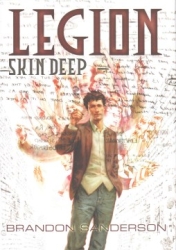
Multiple personalities is one of those tropes that some writers use as a crutch to explain why their main character is so good at a litany of unique skills necessary to move the plot forward. And while the main character in Legion suffers from this superhuman trait, Brandon Sanderson still gives him enough weaknesses so that it's not entirely overpowered. Still, I can appreciate that this concept only took up three novellas (contained in this volume), since it can often overstay its welcome.
Each of the stories revolves around Stephen Leeds, a super-genius investigator who has portioned off his polymath of abilities to different personalities in his head. These personalities take up a physical space around him, even if nobody else can see them. Some of the "rules" around these invisible characters didn't seem to make much sense since they're allegedly all in Stephen's head, but I guess a character like this needs a Kryptonite to prevent him from solving all his problems so easily. I also had to suspend my disbelief with the mysteries Stephen was investigating, mostly rolling my eyes at the unbelievable nature of these concepts.
Overall, though, this trilogy of novellas is a solid read. It's basically a novel in three parts, as I've read full books longer than these three novellas put together. The unique personalities of the "personalities" were all quite entertaining, even if they overshadowed Stephen's somewhat milquetoast characteristics. The engineer in me wanted to know more about how this specific form of multiple personality disorder functioned, since it was a unique take on the disability. At any rate, if you're a fan of Sanderson's work, this is a quick read that proves he knows how to write in short form as well as his standard epic-length books.
An overdone trope that doesn't overstay its welcome, I give Legion 4.0 stars out of 5.
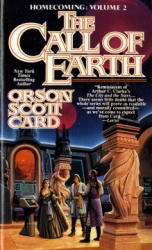
After being so disappointed with The Memory of Earth , I'm surprised I gave the second volume in the Homecoming series a chance. I figured Orson Scott Card could have got things on track by this book, getting rid of all the unnecessary fluff and useless ramblings. Instead, The Call of Earth made it clear to me that I will not be continuing this series. Fool me once, shame on you. Fool me twice, shame on me.
I think part of the problem with this series is how it's written. Having recently read an eye-opening book on identifying "Show versus Tell," it shocked me how much of this book was written with "Tell" language. Granted, a lot of science fiction and fantasy books have to do this to explain interesting magic or technologies. The Call of Earth, however, spent another whole book stuck in this pseudo-Roman society that most people can easily visualize. I'm still convinced he threw this series together to meet a deadline, because it has never felt that inspired.
What's most frustrating is knowing that it could be better. I was expecting this book to be about leaving their planet in search of Earth. Instead, they merely talked about it for 10 hours. None of the characters stood out to me, and whatever plot was there was so forgettable, I don't even care to look up what it was. I get that not every author is going to have all their books be amazing or thought-provoking. But two in a row doesn't give me much hope that the other three books in this series will be any better.
Another disappointing entry in Card's Homecoming series, I give The Call of Earth 2.0 stars out of 5.
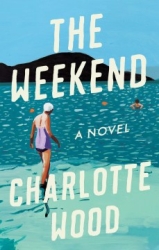
This book by an Australian writer is one of the best novels I've read this year, centering on the lives of four women in their 70s who've known each other for many years. Three of them gather for the duration of the novel to clear out the home of their friend who has died and to know that this place too will no longer be part of their lives. Readers are witness to their struggle to come to terms with their loss and how they will (or won't) continue their now-reduced friendship. The narration toggles easily from one of the (living) women to the next and back, always propelling plot elements even as the narrative voice changes so that the reader isn't getting "re-runs" of several occurrences just because the point of view changes. In addition, each character is sharply defined and unique, so different from each other, in fact, that it's a wonder they were ever friends to begin with. And this narrative tension among the three as they each ruminate on their memories of the absent fourth and chafe against the foibles and flaws of each other felt poignant and, to me, exquisitely realistic.
Many books I've read that I've loved for a good portion have fallen apart or ended on a "bleh" or even a "wtf?" note. Not this time! What will probably stay with me the longest as Wood's admiring reader is the graceful precision of her final depiction of these tough, wise, messy, sad, funny, and unforgettable women. It involves some high drama, for sure, but also, the ocean--and what this small coastal Australian slice of it has meant to all of them.
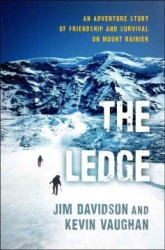
Humans are incredible creatures. There's a resilience for life that shows up in the most dire of circumstances. This is prevalent in many mountaineering books—especially the ones about climbing disasters. The Ledge is the harrowing real-life story of survival against the odds on Mount Rainier. Granted, most stories like this are usually framed with the benefit of hindsight, which can also highlight the risks that led to the disaster. It's amazing that anyone survived this situation, which is what makes this book an entertaining read.
There are a lot of extreme outdoor people in Colorado. My risk tolerance is usually low enough that I think what they do is crazy. I know it's easy to judge when things go wrong, so it s comforting that the situation that led to the titular ledge was mostly because of bad luck. An alignment of poor conditions can take even the most experienced mountaineers by surprise, just like it did here. I appreciate the decisions made in the moment were still the smartest options available.
While I wasn't wild about the back-and-forth framing of the disaster interspersed with flashbacks and exposition, it helped break up the intense sections where Davidson climbed out of the icy crevasse. I'm also glad that this book addressed the aftermath of the disaster, including all the PTSD and other mental effects associated with it. So many disaster books just stop at the point where they're rescued. That there was closure to the events that happened on Rainier helped to tell a complete story. After all, these are the things most people don't consider when dealing with the severe trauma involved with such a story of survival.
A harrowing tale of mountaineering survival, I give The Ledge 4.0 stars out of 5.
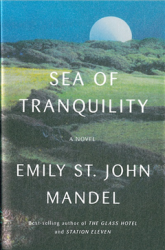
Science fiction often bogs itself down in the details of a potential future while forgetting the poetry that can come with the written word. It doesn't matter what scientific topic the book is handling if it's not entertaining to read. The best ones are a combination of speculative science, entertainment, and beautiful prose. I feel Sea of Tranquility meets these three criteria. The narrative is gripping, the framework thought-provoking, and the execution superb. I've never seen such a common sci-fi topic like this handled so well.
Time travel feels like it can be a crutch for a writer. It's a way to fill in details in a non-linear format that covers up any plot holes in a way that feels cheap. Jumping around in time can also make things confusing, as it isn't clear what era each section is set in. However, the way Emily St. John Mandel handles time travel in this book is probably one of the best I've seen. While following a linear timeline (somewhat akin to Cloud Atlas), the depth of time travel reveals itself with each jump into the future.
I think the reason I love how this book handles time travel is that each revisit of events adds layers of context that almost require an immediate second read-through of the entire book. Sure, the time travel explains away certain mysteries—but giving the reason behind those moments just elevates the story to higher levels. And throughout the whole thing, the descriptions, wording, and overall writing is just fantastic. Even if you don't like science fiction, this book stands out as a well-written piece of work that dives deeper into how humans can't ever know the full extent of a moment from a singular perspective.
The best time travel book I've ever read, I give Sea of Tranquility 5.0 stars out of 5.
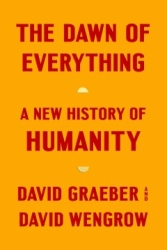
Every once in a while, I come across a book that feels like it's way above my head, but changes how I think about the world. Their analysis calls into question the known understanding of something and references plenty of famous individuals who have written on the topic. Unfortunately, a neophyte like myself does not know who any of these people are. The Dawn of Everything is very much one of these kinds of books for me.
Not knowing much about anthropology or ancient human civilizations, I came in with an open mind and found some intriguing points put forward in this book. We often look at history through modern lenses, but how often are we merely adopting the modern lenses of those before us? If the common thinking cannot support the physical evidence, should we continue to believe it? I learned a ton by reading this book, and I don't even feel like I was grasping everything that it was trying to convey because I wasn't as intimately familiar with the standard model it was trying to deconstruct.
While I think The Dawn of Everything can be approachable for anyone looking to educate themselves about how humans used to interact, it suffers from being occasionally overly academic. There are tons of examples brought forth in this text that merely reinforce the main thesis, each time trying to discredit some previously held belief that I wasn't aware existed until I read it for the first time here. At a certain point, it gets redundant. Still, there were many ideas it presented that made sense enough for me to consider that the authors were onto something big.
A mildly bloated re-thinking of the structure of early human societies, I give The Dawn of Everything 4.0 stars out of 5.
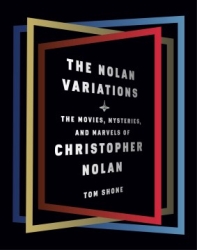
Anyone who has met me knows I am a huge fan of Christopher Nolan's movies. His ability to provide a psychological, mind-bending narrative has kept me engaged for decades. It only makes sense that I would then read the pseudo-biography / interview, The Nolan Variations. Tom Shone's writing style feels intimate and personable in a way that made me feel closer to Christopher Nolan after reading this book. Whether or not you like his films, The Nolan Variations is important to get into the headspace of this acclaimed director.
The Nolan Variations dives into each one of Nolan's films, starting with Following (1998) and ending with Tenet (2020). That it provides hints of his Oscar-winning next film, Oppenheimer (2023) is really quite prescient. Unfortunately, this is also the one weakness of such a book. While it covers everything up to Nolan's peak, unless there's a "Volume 2" of this book, there will always be key elements of his filmography missing. Sure, it's interesting to see how he got here, but what happens next? Where does he go from here?
The casual way in which Shone reveals these deep insights into Nolan's mind is truly the best part of The Nolan Variations. I learned so much about Nolan's thought process, and a deeper understanding of each one of his films. That there's still some ambiguity in the endings of his movies even after reading this book just goes to show how talented Nolan is at crafting true head-scratching cinema. If you want the most thorough, behind-the-scenes look into 11 of the best movies to come out of the last three decades, then this is the book for you.
A relatable look into the mind of this generation's best director, I give The Nolan Variations 4.5 stars out of 5.
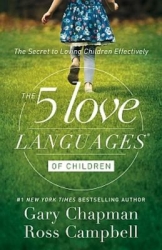
Say what you will about any of the "personality type" analyses out there, but being able to categorize an individual can help to understand them. Whether it's Myers-Briggs, Enneagrams, or the 5 Love Languages, being able to relate to a grouping that helps explain a personality is a great way to find an identity. These may all be pseudoscience, but they're harmless if used in the right ways. The 5 Love Languages of Children helps identify how these personality traits show up in kids.
As a parent, I found this book immensely useful because it revealed what the major (and minor) love languages of my two children are. Knowing how to best fill their "love tank" has helped my wife and I to manage our time with our kids. Knowing how these love languages may change as our kids grow up is just as useful as knowing that they need some of all the types (Gifts, Words of Affirmation, Quality Time, Acts of Service, and Physical Touch). After all, parenting kids who feel loved seems to be a much easier task than parenting kids who feel neglected.
With this personality type analysis, there's always a caveat. No single individual will fall entirely into a single category, and these categories may change over time. Still, it's fun to see my kids light up when they receive the love language they most identify with. Not only do I feel the 5 Love Languages are useful in understanding ourselves, but knowing how others (i.e., our spouses and children) receive love is important to growing these key relationships in our lives.
A useful tool to help parents love their children more effectively, I give The 5 Love Languages of Children 4.0 stars out of 5.
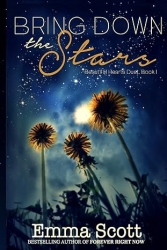
I'm not sure where I picked up this book on Kindle, but it finally took me two years to finish it (I'm excruciatingly slow at reading eBooks). To expand my horizons, I thought reading a romance novel would be good for me. Bring Down the Stars feels like a classic partly due to its heavy resemblance to Cyrano de Bergerac. Its tropes feel solidly planted in the genre, even to the point of being almost timeless. Still, the characters are a little frustrating.
When I finally sat down to focus on reading this book, it hooked me pretty well. The writing is beautifully poetic—which is most often seen from the male point of view (POV). The female POV was a good counterpoint to give the reader both sides of the story while also making the miscommunication between these star-crossed lovers a buildup to either passionate love or a complete destruction of the friendship. That dance between the two is likely what keeps people coming back to this genre. I get it now. It's maddening, but I get it.
I found the modern elements interesting because they could have easily been swapped out for similar situations in centuries past. As I mentioned above, this is basically a Cyrano re-telling, but with two athletic college students in love with the same farmer's girl. Which war the men went off to is irrelevant, as it could have just as easily been the American Revolution or Civil War. It frustrated me that there wasn't a conclusion in this book, as it would have been easy to accomplish without the need for a second book. If I feel up to exploring the genre again, I might pick that sequel up.
A modern take on a classic romance, I give Bring Down the Stars 3.5 stars out of 5.
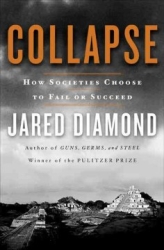
In doing research for book based on the Ancient Puebloan society that used to inhabit the Mesa Verde cliff dwellings, I came across this book. Collapse: How Societies Choose to Fail or Succeed was an eye-opening examination of the factors that can lead to the destruction of a society that could have continued being successful if it weren't for poor resource management. What's frustrating is seeing some of these things becoming prominent in modern society, 20 years after Jared Diamond wrote this book.
While the book covers some case studies where the society identified the problem and moved to fix it, some examples Diamond gives are based on speculation—which one has to do with limited information surviving from those eras. And even though there is an emphasis on environmental factors, sometimes a string of bad years of drought is just the luck of the climate. Unfortunately, while there were hopeful stories of communities who turned away from their destruction, these examples all had one thing in common: the leaders chose to save their society.
I appreciated how relatable Diamond made this text. It wasn't overly academic, but it provided enough details to weave a story that was easy to follow. The cause-and-effect scenarios he presented made sense and provided sensible explanations that the limited data set appears to support. The problem is, even with this knowledge, seeing the path our current society is headed down does not instill the confidence that humanity has what it takes to save itself at the individual level. Of the societies on the brink that survived, their leadership needed to step in to stop the poor resource management. When there's no financial motivation to save the world, the current system seems on track to collapse sooner rather than later.
An approachable and eye-opening look at the factors that brought down empires, I give Collapse 4.0 stars out of 5.